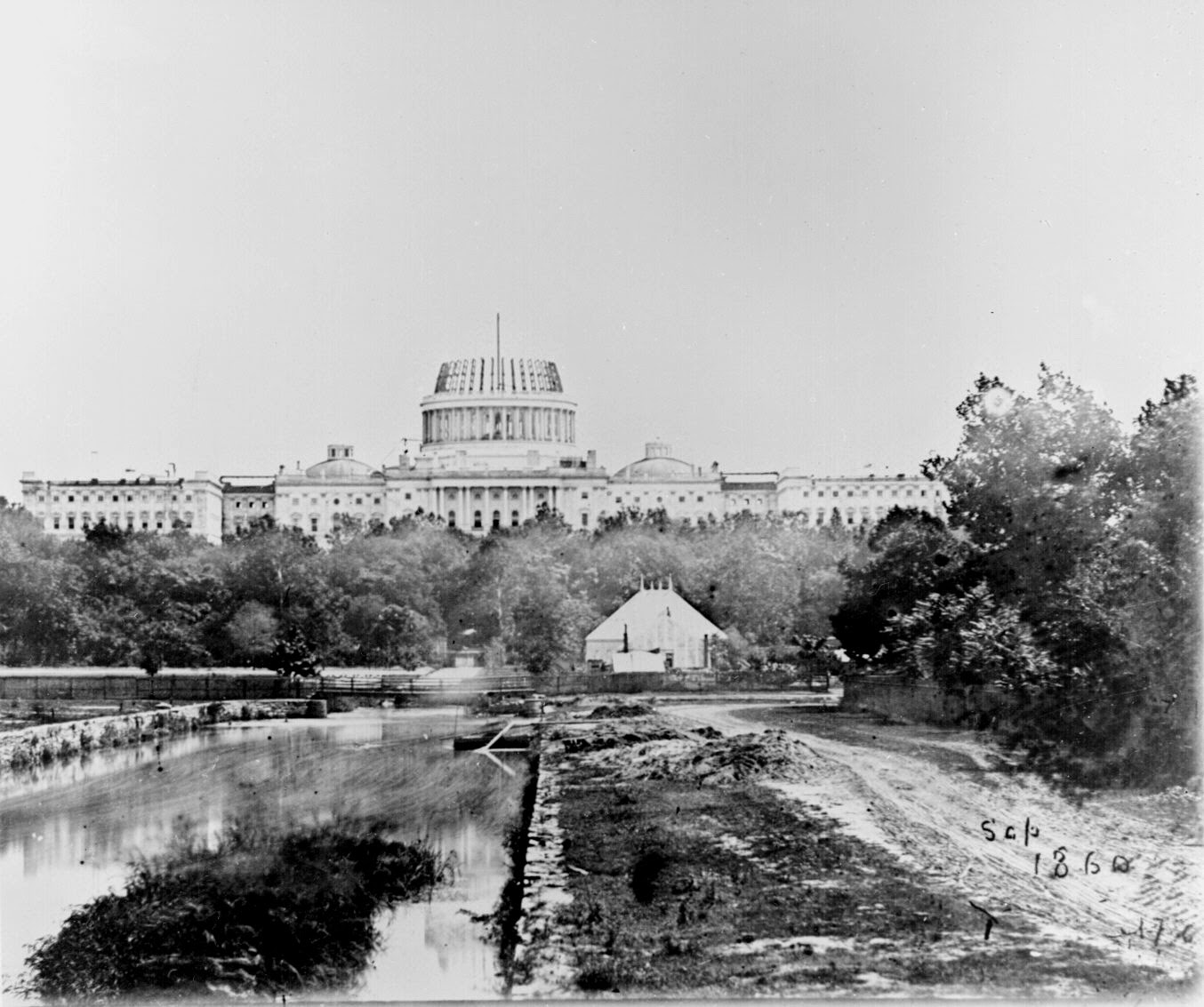What makes Duvergier de Hauranne’s travel narrative Huit
Mois en Amerique a classic? His epistles home to Paris have many qualities: the author’s malleable prose, his sense
of the historical moment, his gift for quick and true portraits of the people he meets -- from high society and low -- and his pointed descriptions of American mores and
foibles. On occasion, his
observations – some one hundred and fifty years later – can even pierce
the wall of time and circumstance and feel as fresh and relevant today as when they were first written.
 |
| U.S. Capitol Under Construction, 1860 |
Viewed from his perch at Willards Hotel, rubbing shoulders with senators,
generals and other notables, Duvergier de Hauranne describes under the heading "The Men in Power" the distinctly
American political class emerging at the end of the Civil War:
Unlike France, America
will never have a true capital, a sort of sovereign queen imposing down to the
smallest detail the rule of her whims on the inert body she drags behind
her. It is more appropriate to
compare London with the future capital of the United States because in London
there is only one society, gathered together for one purpose – politics. Apart from this select circle, London
is really nothing but a particularly large provincial city, a gigantic
Manchester piled on top of a colossal Liverpool…
In England, inherited
social position, the continuity of political alignments and the centuries-old
institution of an aristocratic ruling class combine to give cohesion and unity
to the temporary gathering that is called London Society. In America, on the contrary, even
allowing for the passage of several hundred years and even supposing that by
that time customs and manners will have become uniform, I cannot imagine
anything but a nomadic high society, full of shocking contrasts, with great
diversity of dress and behavior, the faithful image of the democratic society
in whose womb it was formed. The
political milieu will always be a grab-bag of people from all classes and
backgrounds, united today only to be dispersed tomorrow, too fluid for habits
to be fixed or for traditions to be passed on. It will always be a patchwork affair, its members drawn from
the four corners of the nation by the accidents of popular election.
 |
| Dividing the National Map, 1860 |
The differences between “Easterners” and “Westerners” in
Washington’s political circles are more than evident to Duvergier de Hauranne,
who is willing to see the good qualities in both camps, without turning a blind eye to the less salutary. While we may worry today whether the American "Everyman" can truly aspire to political office in an era of fat cat contributors and K Street lobbyists, there are echoes in the Frenchman's account even now of what makes “Blue” and “Red” state politicans distinguishable from one another:
There are, moreover,
two distinct types among the residents of Washington: the Easterners who are much like us Europeans – the most
distinguished among them unconsciously copy British ways – and the Westerners
who, almost to a man, are six-foot giants, coarse-featured, robust in build,
and have mops of hair as thick as horses’ manes…Almost all these vigorous
Westerners have something very attractive and likeable about them. You musn’t expect them to exhibit
refinement of language nor politeness carried to the point of foolish
exaggeration; but for frankness, openness and good fellowship mixed with
shrewdness they have no equals.
 |
| Rep. James M. Ashley (R-Ohio) |
I
am not talking about Mr. Chase, who is not so much typical of the West as he is
of New England, where he was born.
As an excellent example of the Westerner at his best I propose a certain
Mr. Ashley, of Ohio, one of the most influential members of the House, a
tireless foe of slavery, a man of generous, jovial aspect who cuts a lively,
even a heroic figure; he is cordial, obliging, informal without being rude,
courtly in his relations with women, and pleasing in his speech. He also shows more genuine zest for
living than any man I’ve ever met.
Powerful, elemental natures such as his continually fill me with amazement
and make me feel like the small, stunted fruit of a kitchen-garden
civilization. When I stand near
the entrance to the Senate at the end of a session and watch all these lusty,
raw-boned fellows come striding out, I feel the same twinge of awe as if a
troop of Horse Guards were parading in front of me…





No comments:
Post a Comment